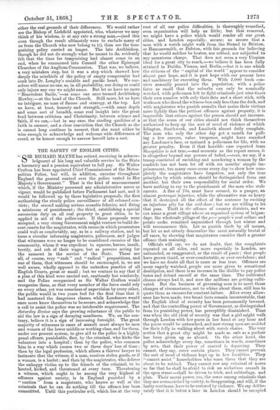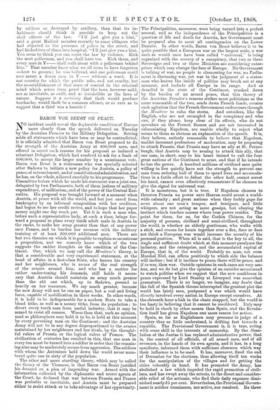THE SAFETY OF ENGLISH CITIES.
-" SIR RICHARD MAYNE has retired, receiving in acknow- ledgment of his long and valuable service to the State a baronetcy and a pension equivalent to full pay. Sir Walter Crofton has been appointed Chief Commissioner of the Metro- politan Police, but will, in addition, exercise throughout England the general control over the police vested in Her Majesty's Government." That is the kind of announcement -which, if the Ministry possessed any administrative nerve or vigour, would be published before Parliament had met, and it would be followed up by three legislative proposals, the first authorizing the steady police surveillance of all released con- victs; the second making serious assaults felonies, and fixing a minimum of punishment ; the third, establishing a special succession duty on all real property in great cities, to be applied in aid of the police-rate. If those proposals were accepted, a very strong Government might venture to build de- cent courts for the magistrates, with rooms in which prosecutors could wait as comfortably, say, as in a railway station, and to issue a circular informing magistrates, policemen, and judges that witnesses were no longer to be considered enemies of the community, whom it was expedient to squeeze, harass, insult, terrify, and rob of their wages, but as persons acting for -the moment in the service of the State. These are all, of course, very "rash" and " radical " propositions, and one of them, that witnesses should be encouraged, is, we are -well aware, wholly opposed to the unbroken practice of all -English Courts, great or small ; but we venture to say that if a plan of this kind were carried out, cautiously but resolutely, and the Police reorganized as Sir Walter Crofton would -reorganize them, so that every member of the force could rely on every other, yet was conscious of supervision by every other, -the public would in two years feel for the first time that it lad mastered the dangerous classes, while Londoners would once more know themselves to be secure, and acknowledge that a call to assist the police was no intolerable requirement. The Saturday Review says the growing reluctance of the public to -aid the law is a sign of decaying manliness. We, on the con- trary, believe it is a sign of increasing foresight. The great -majority of witnesses in cases of assault must always be men and women of the lower middle or working class, and for them, -under our present system, to give aid to the police is a highly penal offence, punishable, first, by the criminal, who kicks the -volunteer into a hospital ; then by the police, who summon in a way which causes two or three days' loss of time ; -then by the legal profession, which allows a thieves' lawyer to insinuate that the witness, if a man, receives stolen goods, or if a woman, is a harlot ; and then by the magistrates, who deliver the unhappy victim up to the friends of the criminal, to be 'hooted, kicked, and threatened at every turn. Threatening a witness, which ought to be among the very highest of offences against society, is in England punished by a
"
caution" from a magistrate, who knows as well as the criminals that he can do nothing till the offence has been committed. Until this particular evil, which lies at the very
root of all our police difficulties, is thoroughly remedied, even organization will help us little; but that removed, we might have a police which would render all our great cities, and London especially, secure; so secure that a man with a watch might walk from the Strand to Brixton, or Hammersmith, or Dalston, with fair grounds for believing that he would neither be beaten, nor robbed, nor subjected to any monstrous charge. That does not seem a very Utopian ideal for a great city to reach,—we believe it has been fully attained in Dublin, Vienna, and Berlin,—but it is one which the citizens of the "capital of the world" appear to consider almost past hope, and it is past hope with our present laws and machinery for executing them. With 2,000 fresh con- victs annually poured into the population, with a police force so small that the suburbs can only be nominally watched, with policemen left to fight criminals just nine times their own number with only their fists and a short stick, with workmen who dread the witness-box only less than the dock, and with magistrates who punish assaults that maim their victims more lightly than the pettiest offences against property, it is impossible that crimes against the person should not increase. or that the scum of our cities should not think themselves authorized to keep up the sort of revel of violence of which Islington, Southwark, and Lambeth almost daily complain. The man who only the other day got a month for pull- ing a few carrots, value twopence, might have smashed any Londoner's face, or maimed a policeman for life, with no greater penalty. Even if that horrible case reported from Shropshire is not true,—and accurate as the report seems, it is altogether beyond our powers of belief,—even, we say, if a tramp convicted of ravishing and murdering a woman by the roadside has not been let off with six months' simple im- prisonment, too many cases occur every day to show how com- pletely the magistrates have forgotten, not only the true principles by which crimes should be distinguished from one another, but their own responsibility for social order. We have nothing to say to the punishment of the man who stole carrots. A fine of 76s. must have seemed, to a pauper, an almost grotesque injustice, while the alternative was so heavy that it destroyed all the effect of the sentence by exciting an injurious pity for the evil-doer ; but we are willing to let that pass. Theft is the offence of country districts, and we can name a great village where an organized system of brigan- dage, the wholesale pillage of the poor people's coal cellars and potato sacks, remained unpunished through last winter and will recommence this. Let us punish theft by all means, but let us not utterly demoralize the most naturally brutal of all races, by showing that magistrates consider theft a greater offence than maiming.
Officials will say, we do not doubt, that the complaints repeated on all sides, and more especially in London, are unfounded, or exaggerated, or the result of panic ; that people have grown timid, or over-comfortable, or over-credulous; and we have no doubt all that is more or less true. Offences are more eagerly watched, people are more given to sensational desCription, and there is an increase in the dislike to pay police taxes and defend oneself at the same time. The cultivated classes always had it, and now the millions are getting culti- vated. But the business of governing men is to meet those changes of circumstance, not to whine about them, still less to quote them as excuses for constant failure. After every allow- ance has been made, two broad facts remain incontestable, that the English ideal of security has been permanently lowered, and that the controlling power of Government, as distinguished from its punishing power, has perceptibly diminished. Time was when the old ideal of security was that a girl might walk through London with her purse in her hand at any hour and the purse would be untouched, and now strong men are scolded for their folly in walking about with watch chains. The very notion that a great city might be made as safe as a parlour has been given up as absurd. On the other hand, the police acknowledge every day, sometimes in words, sometimes by acts, that their power of control is departing. They cannot, they say, enter certain places. They cannot prevent the sort of revel of violence kept up in low localities. They "cannot assist" householders who warn them that they are about to be robbed. They cannot cow any criminal of nerve so far that he shall be afraid to risk an audacious assault in the open street—shall be driven to trick, and subterfuge, and plan. Their moral power, too, the sense among criminals that they are overmatched by society, is disappearing, and will, if the laxity continues, have to be restored by violence. We say delibe- rately that it is better a lane in London should be occupied
by soldiers or destroyed by artillery, than that its in- habitants should think it possible to keep out the civil officers of the law. "I'll just give you a hint," said a great Radical member recently to some villagers who had objected to the presence of police in the street, and had kicked two of them into hospital, "I'll just give you a hint. You seem to think you can resist the law by violence. Kick the next policeman, and you shall have ten. Kick them, and every man in Y— shall walk about with a policeman behind him." That member knew what we all seem to have forgotten —how to govern ; he was believed, and one policeman could now arrest a dozen men in Y— without a word. It is not severity for which the public asks, and not cruelty, but the re-establishment of that sense of control in the criminal mind which arises from proof that the laws, however mild, are as inevitable, as swift, and as irresistible as the laws of nature. Suppose it a certainty that theft would produce toothache, would theft be a common offence, or so rare as to suggest that a thief was a lunatic ?































 Previous page
Previous page